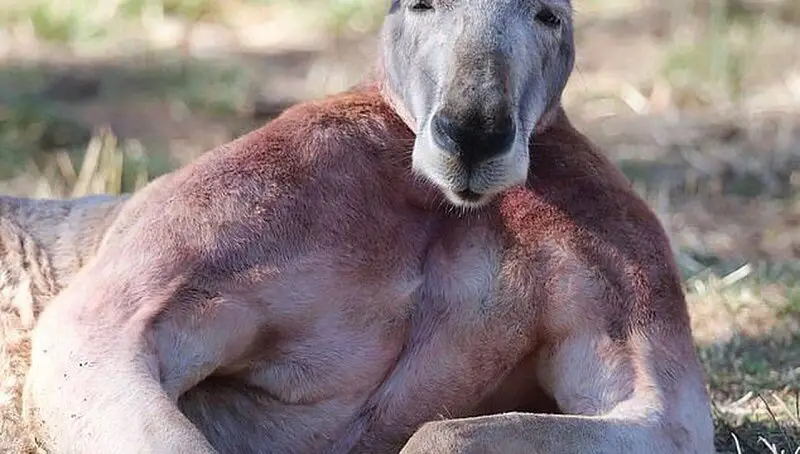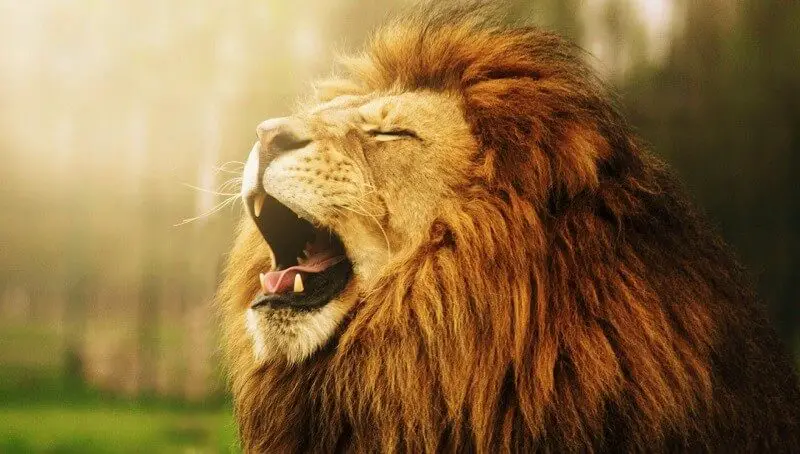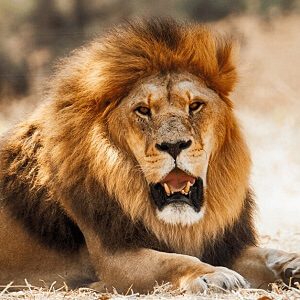
Which Birds are Considered Mammals? – Mammals With Wings
May 1, 2022
Why Are Kangaroos So Buff? Kangaroos and Their Muscles
May 2, 2022
The roaring of the male lion is something most people know and are impressed by. It signifies strength and might and this is why it is heavily depicted in movies, paintings, and a lot of other art forms for that matter. You might like how this animal and its roar are portrayed in the movies but if you ever have a chance of hearing it in the wild, then you will really be impressed.
But did you ever stop and wonder why di lions actually roar? There is surely a reason for such a magnificent thing to happen.
Lions are a very social type of animal and they have different ways of communicating with each other. Roaring is an important part of the interaction between different lions but also a way in which a lion will get the attention of other animals. These animals use roaring to warn any intruders that they have to stay away.
Not all roars have territorial reasoning and sometimes males and females will roar to show their strength and health. These powerful sounds will also help them give out their location to other members of the pride. During mating periods, lionesses will roar to communicate to males that they are ready to reproduce. Although all roars have one connection or another to their social life, not all roars are considered the same or even sound the same.
So why do lions roar?
The family of felines has most of its members dedicated solitary hunters. They have adapted over the years and really enjoy hunting on their own. As soon as they reach their adult age, most of the wild cats will move away from their siblings. Up until that point they are still very much dependent on the pack.
You might also like my article on whether lions eat hyenas.
Lions are one of the very few felines that don’t adhere to this rule. They are very social and will live in groups called pride for most of their lives. They will also have a very strict hierarchy.
The usual pride will consist of mostly female lions and their cubs, having no more than one to three male lions. A pride will have only dedicated members that follow strict rules. The price can be considered a matriarchy from this point of view. Seeing how there are very few males in a pride, the females will be the ones in charge of taking care of the cubs, but also guarding the territory and hunting for food.
Male lions have a lot less on their heads inside the social group. They have two main tasks: reproducing with the females and guarding the pride against any threatening male lions. When they do neither of these two tasks, they are known to be sleeping throughout the day.
Lions in general are heavy sleepers, with females sleeping around 15 hours a day, while males spend nearly 20 hours each day sleeping.
As I already said, lions are the type of social animals that communicate a lot with other members of their group. They have their unique ways of expressing their feelings. They would loop their tails with each other, lick one another or even rub their heads with other lions.
Lions will use roaring and other sounds as a very important part of their interaction with other lions and even other animals. The roar of a lion is easily heard from even five miles away. The roar will be different depending on why they do it. Lions don’t just roar, but they also use other sounds as well, like moaning, meowing, snarling, growling, and even grunting.
During their heat periods, female lions will use, aside from roaring, body language and scents to communicate their availability to males. Roars will also be very useful when a member gets separated from the price and other members need to get to them.
Some lions roar at night. Why Do They?
Most lions will be very active during the night, considering that they spend a big part of the day sleeping and relaxing. This is why they can be heard roaring even at night.
 Although most of the folklore portrays them as animals that only roam while the sun is up, lions are pretty much nocturnal animals. This means that they will not only roam but also hunt and do any other activities mostly during the night.
Although most of the folklore portrays them as animals that only roam while the sun is up, lions are pretty much nocturnal animals. This means that they will not only roam but also hunt and do any other activities mostly during the night.
This isn’t a set-in-stone rule, as lions are also very opportunistic hunters. They would never miss an opportunity to hunt for easy prey during the daytime. This happens a lot when they are close to a source of water where prey might gather. They won’t wait for the night and will prefer to follow the prey that comes to drink water.
Would a lion roar while hunting?
Most of the movies will teach us that lions roar when hunting for prey. This is mostly considered a false fact and one of the many things that Hollywood usually gets wrong. Lions are hardly ever heard roaring while they are pursuing prey.
It would make no sense for a lion to roar while trying to hunt. It would be counterproductive when considering the two different tactics lions use to hunt.
The first hunting technique the animal uses is to stalk the prey. Lions would go through a lot of effort to stay hidden for as long as possible and then attack the target only when it gets very close to them. When the prey is close enough, they will charge will a lot of speed and only then chase it.
The second tactic, mostly used for bigger prey, will involve the pride attacking all at once, trying to corner an animal and attack it from multiple sides. This scenario will usually unfold without the help of male lions.
Some lions roar in the Zoo. Why do they?
Compared to when they are in the wild, lions will roar a lot less in the zoo. This is usually because as soon as they get used to people looking at them, they will hardly have a reason to roar trying to warn trespassers.
They won’t consider people trespassers and they won’t see any new lions so they won’t feel the need to roar. They will keep roaring for all of the other reasons, it would just happen more rarely.
One of the main reasons will remain to show that they are still strong and healthy to other lions.
Why is the roar of lions so loud?
Lions are known to have the loudest roar of all the felines. It will be 114-decibel strong from up close. This is almost as loud as a jet plane would be at take-off, which would be around 120db. It would be louder than a live music concert which is usually only at about 110 dB.
So why are lion roars so strong?
The anatomy of the lion’s vocal cords is what makes the roar so strong. Their vocal cords are not in the shape of a triangle like the ones of other animals. They are shaped like a square and a lot flatter.
This shape would enable them to create a lot louder sounds with less help from the lungs as air passes through. Although this is something similar between lions and tigers, the lions will still have louder roars.
Would a lion roar after catching prey?
Lions don’t roar after catching prey. They would, in turn, growl or snarl at any scavengers that would come for a free bite. They will never feel the need to roar to mark successful hunts.
A successful hunt will instead lead to an eating hierarchy among the lions of a pride. Males are the ones that eat first although they will have no participation in the actual hunt. They are followed by the females that got the prey, and to most people’s surprise, cubs will eat the last.
Conclusion
Roaring is a big part of the lion’s life and socialization with other animals. It is either a sign of aggression, a mating ritual, or the expression of another emotion. Lions will use roaring to show their strength and mark their territory.
